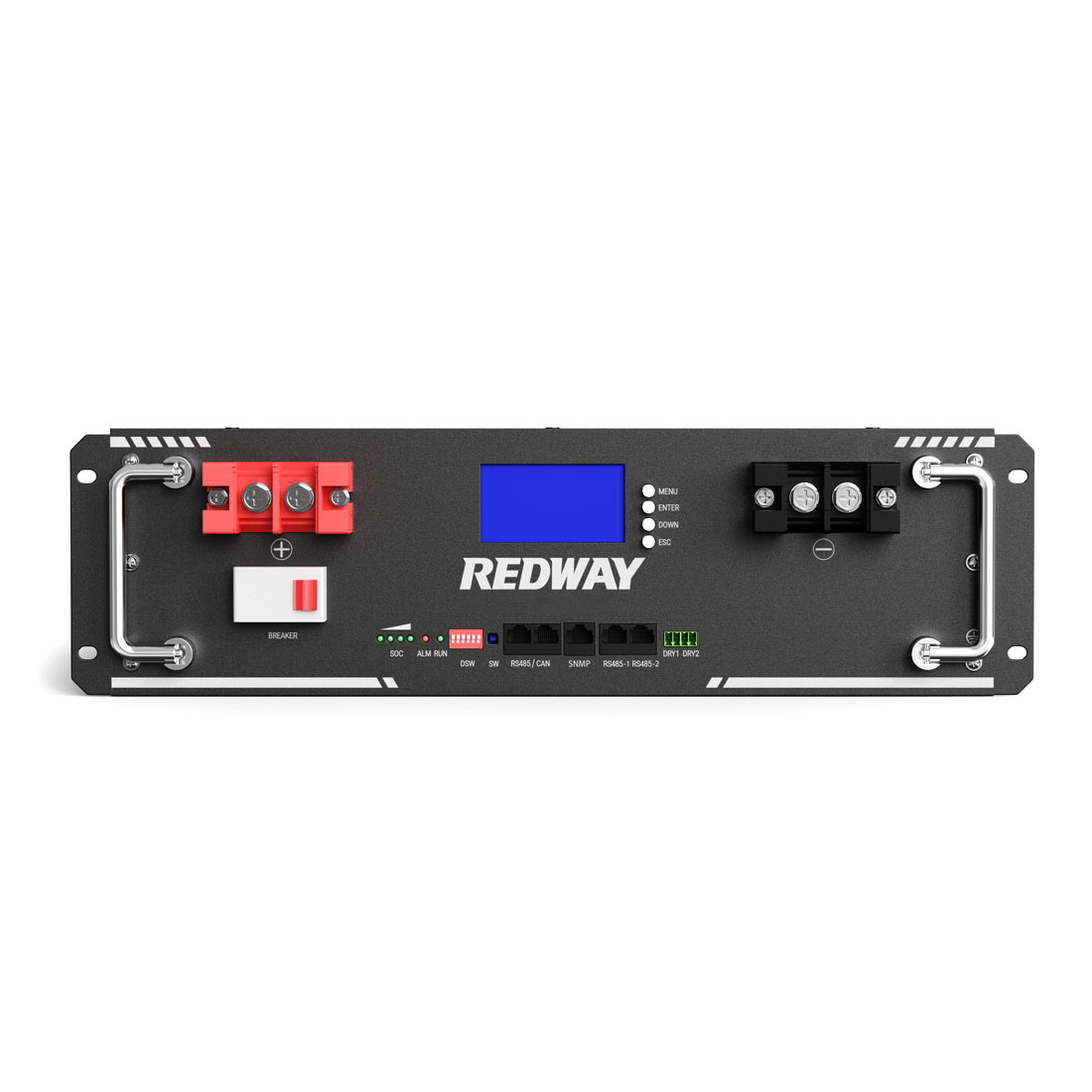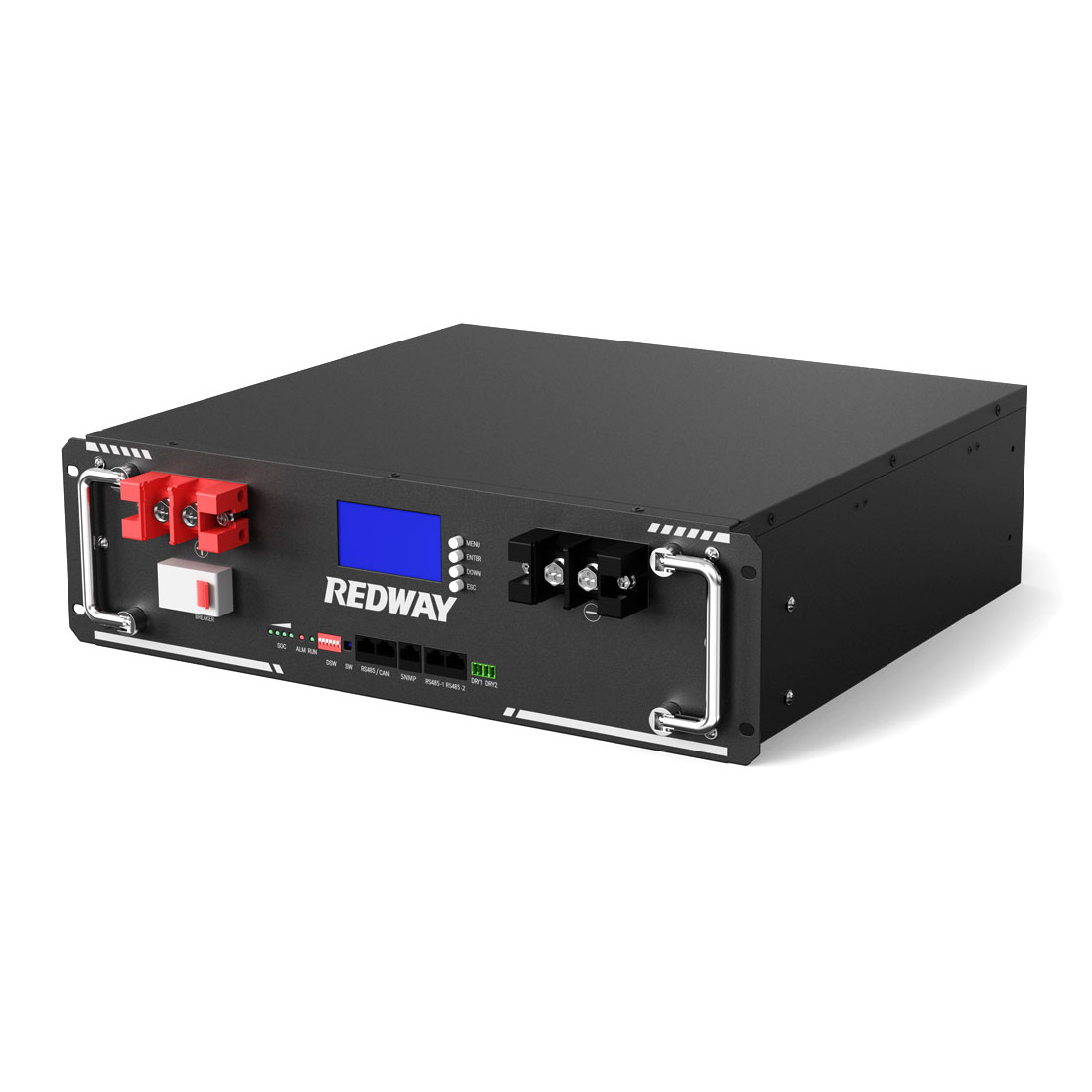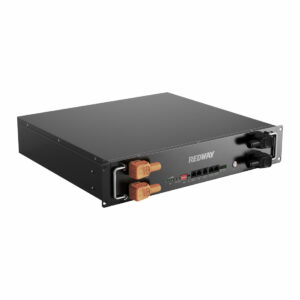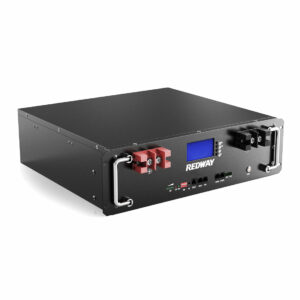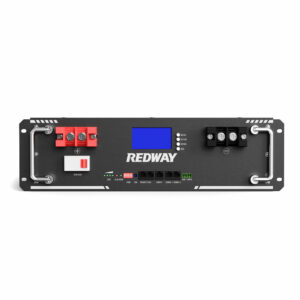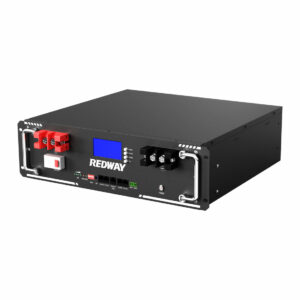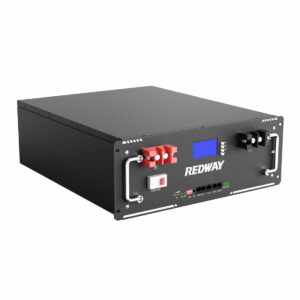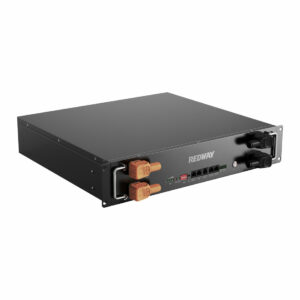Description
The 48V 100Ah Lithium Battery (RG48100P) is an industrial-grade energy storage solution designed for OEMs, ODMs, and wholesale buyers seeking reliable power for telecom base stations, C&I ESS, data centers, solar systems, and hybrid energy storage applications. With 4.8 kWh capacity and LiFePO4 technology, it combines durability, safety, and scalability for demanding environments.
Key Features
Unmatched Cycle Life: Delivers 8000+ cycles at 80% DOD, ensuring a 20-year design life for long-term ROI.
Industrial Certifications: Compliant with UL1642, UL1973, IEC62619, CE, and UN38.3, guaranteeing global safety and quality standards.
Modular Scalability: Supports up to 16 parallel units (expandable to 32) for flexible energy expansion.
Smart Communication: Built-in SNMP, RS485, and optional Bluetooth, WiFi, or 4G for real-time monitoring and control.
OEM Customization: Tailor silkscreen labels, laser logos, and add-ons like self-heating, CAN-bus, or fire suppression systems to meet specific project requirements.
Product Description
The 48V 100Ah Lithium Battery integrates LiFePO4 cells and a JBD Communication BMS to ensure protection against overcurrent, overvoltage, and extreme temperatures (-20¡ãC to 60¡ãC). Its compact 3U design (440 x 440 x 136 mm / 39 kg) enables seamless installation in server rooms, hospitals, schools, or off-grid solar systems.
Engineered for OEM partnerships, this battery supports compatibility with leading inverters like Deye, Victron, and Growatt. Optional upgrades include thermal aerosol fire suppression, solar MPPT, and cabinet enclosures for enhanced safety and functionality. With IP21-rated housing and threaded M6 terminals, it¡¯s optimized for indoor industrial use while maintaining user-friendly operation via LCD display and power switches.
As a lithium battery manufacturer focused on OEM collaboration, we provide end-to-end customization, from communication protocols to certifications, ensuring seamless integration into your energy storage projects. Trust the RG48100P to power critical infrastructure with efficiency, scalability, and uncompromising reliability.
Why Choose a 48V 100Ah Telecom Rack Lithium Battery with SNMP?
The 48V 100Ah telecom rack lithium battery with SNMP is an advanced energy storage solution offering reliable power, remote monitoring, and long-term performance for critical telecom applications. Its LiFePO4 chemistry and 3U rack design maximize efficiency and safety.
How Does a 48V 100Ah Lithium Battery Benefit Telecom Applications?
A 48V 100Ah lithium battery provides a stable and efficient power supply for telecom equipment. With a capacity of 4.8kWh, it ensures reliable backup during grid outages, minimizing downtime and maintaining network uptime. Its compact 3U design fits seamlessly into standard telecom racks, optimizing space utilization2. Compared to lead-acid batteries, it offers a longer lifespan, faster charging, and reduced maintenance, enhancing the overall performance and reliability of telecom systems25.
What Makes SNMP Monitoring Essential for Telecom Batteries?
SNMP (Simple Network Management Protocol) enables real-time remote monitoring of battery parameters such as voltage, current, temperature, and state of charge. This proactive monitoring allows telecom operators to detect potential issues early, reducing downtime and improving operational efficiency. SNMP facilitates seamless integration with network management systems, providing comprehensive visibility and control over the battery system. This is crucial for maintaining consistent performance and preventing unexpected failures in telecom infrastructure5.
Which Communication Protocols Are Supported for Integration?
Besides SNMP, the 48V 100Ah telecom rack lithium battery supports RS485 and CAN-bus communication protocols. These interfaces ensure compatibility with a variety of inverters and energy management systems, such as GROWATT, Victron, and Deye. The versatile communication capabilities facilitate comprehensive data exchange and control, allowing operators to monitor and manage the battery system effectively2.
Why Is LiFePO4 Chemistry Preferred in Telecom Rack Batteries?
LiFePO4 (Lithium Iron Phosphate) chemistry offers superior safety, thermal stability, and a longer cycle life compared to other lithium-ion chemistries. LiFePO4 batteries are less prone to thermal runaway, making them ideal for indoor rack-mounted installations. They can withstand thousands of charge-discharge cycles (typically over 7000 at 80% DOD), ensuring long-term reliability and reducing replacement costs2. This robust chemistry ensures stable performance, making it a preferred choice for critical telecom applications.
How Does the 3U Rack-mounted Design Optimize Space and Installation?
The 3U rack-mounted design conforms to standard telecom rack dimensions, allowing easy integration into existing infrastructure. This compact form factor maximizes space utilization, which is especially important in crowded telecom facilities. The modular design simplifies installation and maintenance, reducing the time and effort required for battery replacement or upgrades.
What Safety Features Are Integrated into the 48V 100Ah Battery?
The 48V 100Ah telecom rack lithium battery is equipped with a sophisticated Battery Management System (BMS) that provides comprehensive protection against overcharge, over-discharge, overcurrent, short circuits, and thermal anomalies. The BMS continuously monitors battery parameters and takes corrective actions to prevent hazardous conditions. These safety features ensure reliable and secure operation, protecting both the battery and the connected equipment.
Can the 48V 100Ah Battery Operate in Extreme Temperatures?
The battery is designed to operate within a wide temperature range, typically from -20°C to 60°C, making it suitable for diverse telecom environments. Its robust design and LiFePO4 chemistry ensure stable performance even in harsh conditions. However, it is important to keep the battery within the specified operating temperature range to maximize its lifespan and performance.
What Customization Options Does RackBattery Offer?
RackBattery provides tailored OEM and ODM solutions, including customized communication protocols, terminal types, and battery configurations. These customization options allow telecom operators and system integrators to receive batteries optimized for their specific requirements. RackBattery’s expertise in electrochemical devices ensures high-quality, reliable, and customized energy storage solutions.
How Does This Battery Compare to Lead-Acid Alternatives?
Compared to lead-acid batteries, the 48V 100Ah LiFePO4 battery offers numerous advantages, including higher energy density, longer cycle life, faster charging, and reduced maintenance. It is lighter and more compact, simplifying installation and reducing space requirements. Lithium batteries also provide a more stable voltage output, improving the reliability of critical telecom equipment.
Table 1: Key Specifications of the 48V 100Ah Telecom Rack Lithium Battery
| Specification | Details |
|---|---|
| Voltage | 48V |
| Capacity | 100Ah |
| Energy | 4.8 kWh |
| Form Factor | 3U Rack-mounted |
| Chemistry | LiFePO4 |
| Cycle Life | >7000 cycles at 80% DOD |
| Communication Protocols | SNMP, RS485, CAN-bus |
| Operating Temperature Range | -20°C to 60°C |
| IP Rating | IP21 (Indoor use) |
| Max Parallel Connections | Up to 64 units |
| Weight | Approximately 39 kg |
Table 2: Advantages of LiFePO4 over Lead-Acid Batteries in Telecom
| Feature | LiFePO4 Lithium Battery | Lead-Acid Battery |
|---|---|---|
| Energy Density | High | Low |
| Cycle Life | >7000 cycles | 500-1000 cycles |
| Maintenance | Minimal | Frequent |
| Weight | Lightweight | Heavy |
| Charging Speed | Fast | Slow |
| Safety | High (thermal stability) | Moderate |
RackBattery Expert Views
“At RackBattery, we focus on delivering reliable and efficient power solutions for telecom infrastructure. Our 48V 100Ah telecom rack lithium battery with SNMP exemplifies our commitment to innovation and quality. We leverage advanced LiFePO4 chemistry and intelligent BMS technology to ensure long-lasting performance and safety. Our OEM customization options enable telecom operators to receive batteries tailored to their specific needs, ensuring optimal integration and performance.”


